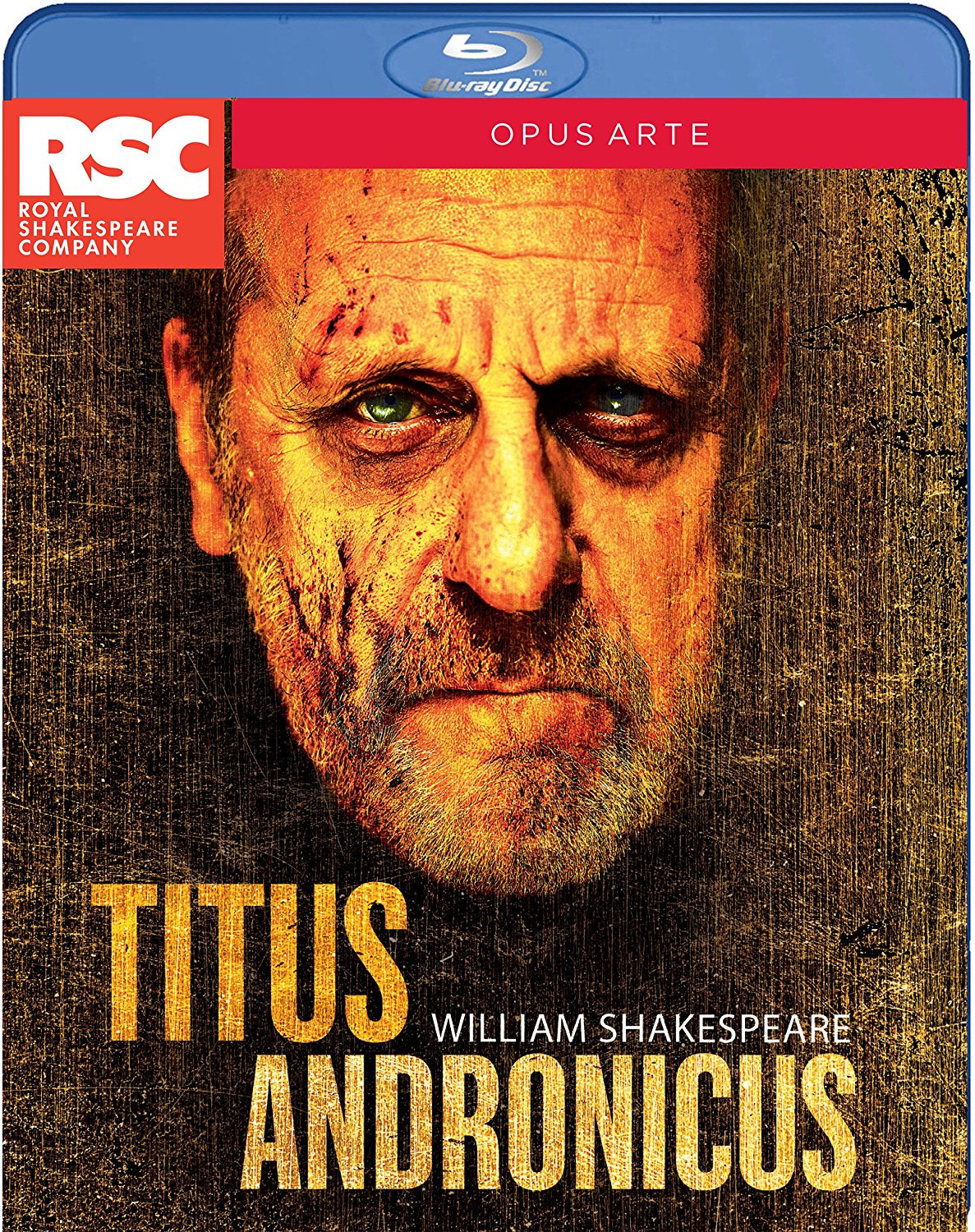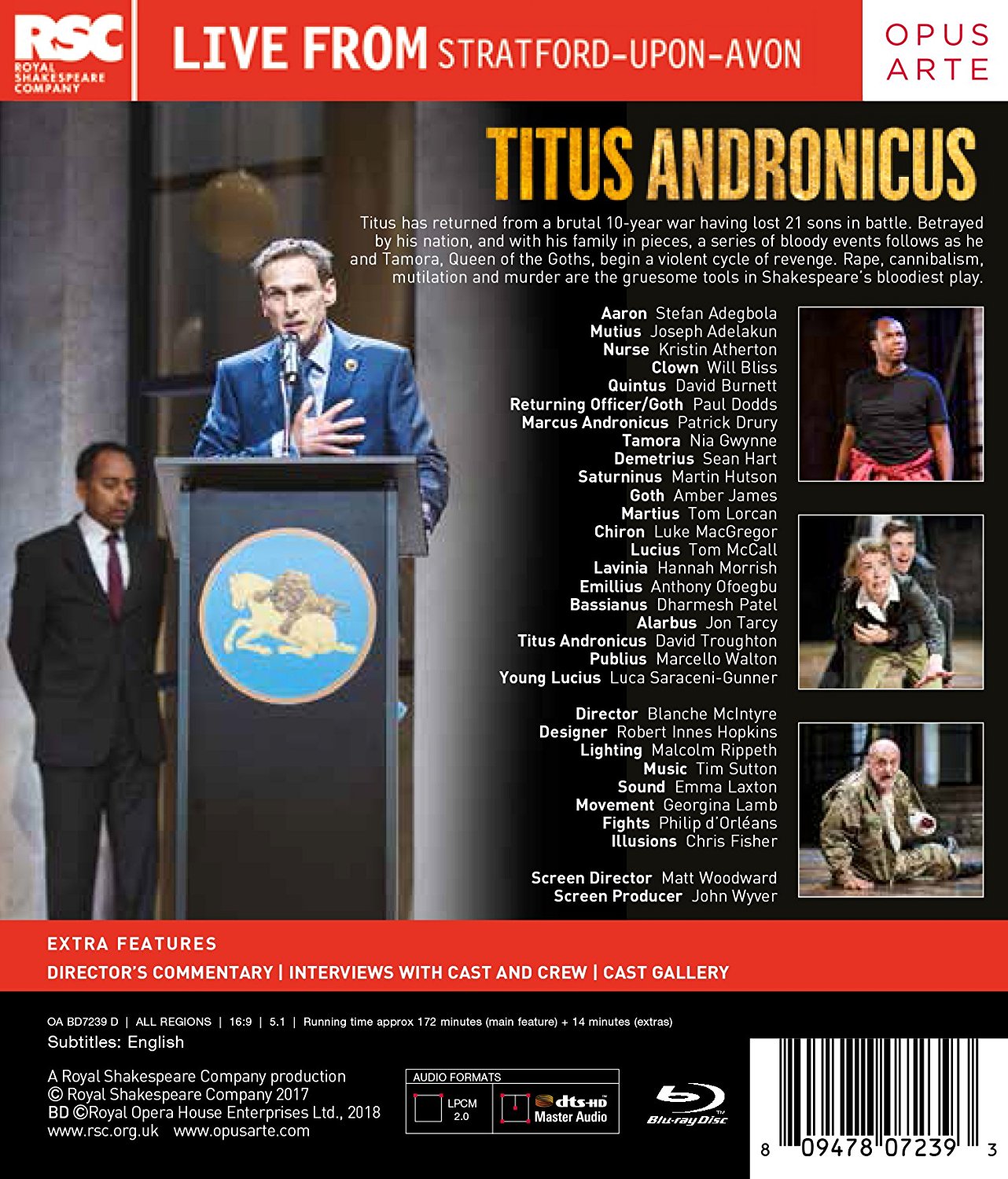

Shakespeare Titus Andronicus. Directed 2017 by Blanche McIntyre at Stratford-upon-Avon. Stars Stefan Adegbola (Aaron), Joseph Adelakun (Mutius), Kristin Atherton (Nurse), Will Bliss (Clown), David Burnett (Quintus), Paul Dodds (Returning Officer/Goth), Patrick Drury (Marcus Andronicus), Nia Gwynne (Tamora), Sean Hart (Demetrius), Martin Hutson (Saturnius), Amber James (Goth), Tom Lorcan (Martius), Luke MacGregor (Chiron), Tom McCall (Lucius), Hannah Morrish (Lavinia), Anthony Ofoegbu (Emilius), Dharmesh Patel (Bassianus), Jon Tarcy (Alarbus), David Troughton (Titus Andronicus), Marcello Walton (Publius), and Luca Saraceni-Gunner (Young Lucius). Designed by Robert Innes Hopkins; lighting by Malcolm Rippeth; music by Tim Sutton; sound by Emma Laxton; movement by Georgina Lamb; fights by Philip d'Orléans; illusions by Chris Fisher. Directed for TV by Matt Woodward; produced for screen by John Wyver. Released 2018, disc has 5.1 dts-HD Master Audio sound. Grade: A+
This is Shakespeare’s controversial revenge/slasher play. For centuries it was thought to be too immoral to stage, and the kind of folks who make their living researching and teaching Shakespeare just never spoke of it. Atrocities in the text (in addition to ordinary routine slayings) include execution by lopping off of limbs, revenge rape of a young virgin aggravated by the cutting off her hands and tongue, severing of a hand by trick, delivery of decapitated heads, a mercy killing, cannibalism, death by starvation, and the wanton dismemberment of a housefly. It’s probable that people in the past were just as cruel and gruesome as they are today, but now the news travels faster. So in recent years critics have started viewing Titus Andronicus as “relevant” in light of, say, the Spanish Civil War, the Holocaust, the Gulag, Rwanda, Bosnia, Sudan, Ciudad Juárez, ISIS, etc.
There is a lot to this play, including a tricky backstory, but we can only superficially touch on the some of the most gory parts. First below is Titus Andronicus (David Troughton) a highly successful Roman general who is a poor politician. We’ll call him here “TA”:
Next below is what’s left of the descendants of TA: 4 sons (including Lucius (Tom McCall) in the foreground) and Lavinia, a virgin, and grandson Lucius. (TA has lost 21 other sons in battle over the years.) The (vile and petulant) Roman Emperor declares his desire to marry Lavina, even though he knows she is honorably engaged to another man (who would also like to be emperor):
The emperor (Martin Hutson on the left) is rebuffed by the family of TA. He suddenly elects to marry instead Tamora (Nia Gwynne), the Queen of the Goths, whom TA has brought to Rome as his prisoner of war and trophy. This was an unfortunate turn of events. TA has just had Tamora’s eldest son sacrificed by having his limbs lopped off. Tamora is eager for revenge and now has a chance to get back into the game!
Tamora uses all her considerable sex appeal and intelligence to seduce the Emperor. She promises the Emperor revenge for both of them:
Below the rape of Lavinia by two of Tamora’s sons. They cut off Lavinia’s hands and tongue so she can’t ID her assailants. Here she is helped by her uncle Marcus (Patrick Drury):
Tamora has taken captive two of the sons of TA. She offers to return them if TA will deliver one of his hands to her. This is all arranged by Aaron (Tamora’s lover) the black man in the suit below. In the text Aaron is a Moor or African, whom Shakespeare presents as the ultimate symbol of evil (more on that later):
So TA gives up a hand (how did they do that?) and gets back the two sons. But the sons are returned in pieces:
More revenge!
Lucius has gone over to the Goths and raised an army to defeat the Emperor. The army is now on the outskirts of Rome. TA sends Marcus to Lucius with an invitation to parley with the Emperor and Empress at a dinner:
TA captures the two sons of Tamora who raped Lavinia. She helps in his revenge on them:
The mad comic dinner. Would you like a copy of the recipe?
Well, the party winds up badly except for Lucius, who wins the Tontine:
Now back to Aaron for a moment. Shakespeare’s greatest sin was his use of an African man as the symbol of evil just to help out with a few lines of poetry. This didn’t matter in 1600 as William was only interested in selling tickets, and there were precious few (if any) African-Elizabethans to offend. Shakespeare wasn’t writing for posterity, so it never occurred to him to consider how his use of Aaron might look to others 400+ years in the future. Still, the Bard may have felt a twinge of doubt. So he at least made Aaron a superhuman of fearless ferocity and perfect integrity:
In 2017, critics who saw this production live were supportive. Michael Billington writing in The Guardian (July 5, 2017) gave this 4 of 5 stars for “tremendous theater” on the theme of “a civilization in terminal decline." Natashe Tripney in www.thestage.co.uk agreed and pointed out Shakespeare’s use of humor to leaven the loaf of horror. Holly William also approved in www.thestage.co.uk, noting that director McIntyre is a woman who provides good balance between the horror and humor of Shakespeare’s writing except when considering the situation of Lavinia, about which there is never any levity.
The disc has good extras including cast photos, interviews with stars, and a director’s cut with voice over. The only problem with the director’s cut is that McIntyre speaks at the rate of about 1000 words per minute with a heavy Brit accent. Still, watching the extras will doubtless help you track the story better. The more you look into this, the more you get out. Titus, the faithful soldier, made a big mistake in supporting the appointment of a poor leader. And picking a poor leader can lead to bad consequences. To sum up, this is another big success for the RSC and gets an A+ grade notwithstanding the troubled reputation of the text.
Here are trailers from the RSC:
OR














